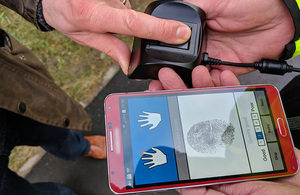 The government has recently announced that West Yorkshire Police has signed up to a new identity checking service. This represents a further roll out of police fingerprint checking by portable scanner and phone app.
The government has recently announced that West Yorkshire Police has signed up to a new identity checking service. This represents a further roll out of police fingerprint checking by portable scanner and phone app.
The new service is already being used in a select number of force areas. A further twenty areas will be going live before the end of this year. This form of police fingerprint checking will remove the need for suspects to be taken to a police station to check identity.
It is anticipated that this will reap benefits for front line officers and suspects alike. Previous research found that the average time for an identity check was sixty seven minutes. As a result the police will be freed up the to continue with other duties. From a citizens point of view, the number needless detentions should be drastically reduced.
Support for Police fingerprint checking in the street
Police leaders have commented:
“Early examples of the new system in action include a firearms unit, who detained a driver after a short pursuit and were able to identify him as a disqualified driver, despite him giving false details. He was issued with a summons for three offences and his vehicle seized. The armed response unit returned to patrol within ten minutes, and without the mobile fingerprint scanner this could have resulted in the unit being out of action for four hours taking the individual to a custody suite.”
How does the service work?
 The new service works by connecting a small fingerprint scanner to a mobile phone App. Within seconds of taking a print the suspect’s identity can be checked across the two main police databases, allowing police after that to deal more appropriately with the suspect.
The new service works by connecting a small fingerprint scanner to a mobile phone App. Within seconds of taking a print the suspect’s identity can be checked across the two main police databases, allowing police after that to deal more appropriately with the suspect.
While this technology has been available for a few years, reduced pricing has now made it affordable enough for a national rollout. Scanners that previously cost around £3,000 can now be purchased for under £300.
Concerns about consultation and implementation
Liberty, the leading human rights organisation has been less enthusiastic, commenting that:
“This scheme is part of a pattern of the police using radical privacy-invading technology without proper public consultation or meaningful parliamentary oversight. Much like the facial recognition technology that is increasingly being deployed by police forces, it is being presented to us after the event and with little fanfare and is being made available to more and more officers across the country. In this case, we learned about it via a sneaky gov.uk post early on a Saturday morning.”
There are important protections for suspects that are to be found in the Police and Criminal Evidence Act 1984. If you have any concerns about the use of these powers, please contact us to discuss further.
Where fingerprint identification is being used to provide evidence in support of a prosecution, we will always take particular care to ensure that the law has been complied with.
How We Can Help
If you are a person facing a criminal investigation or proceedings, contact us immediately. Our solicitors are well versed in this and all other aspects of the criminal law and will work to ensure your best defence.
Your nearest office can be found here.
Alternatively you can use the contact form below.



